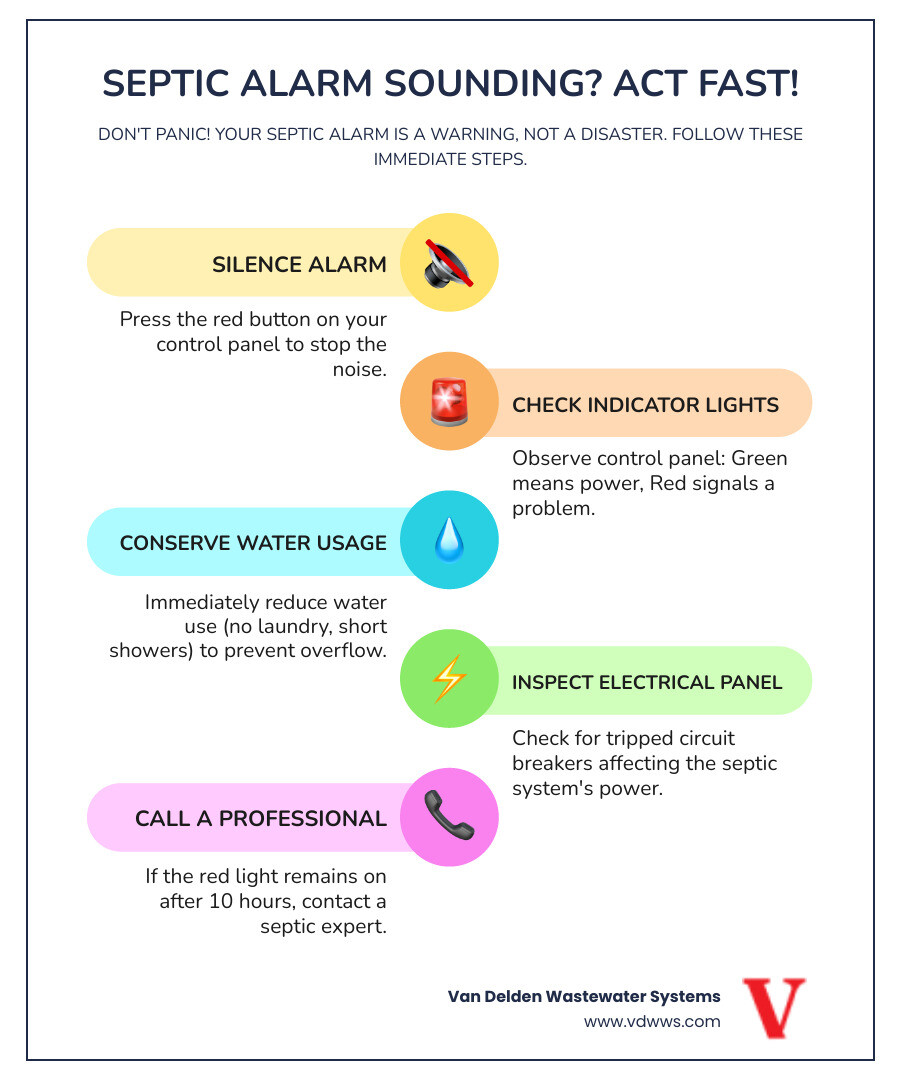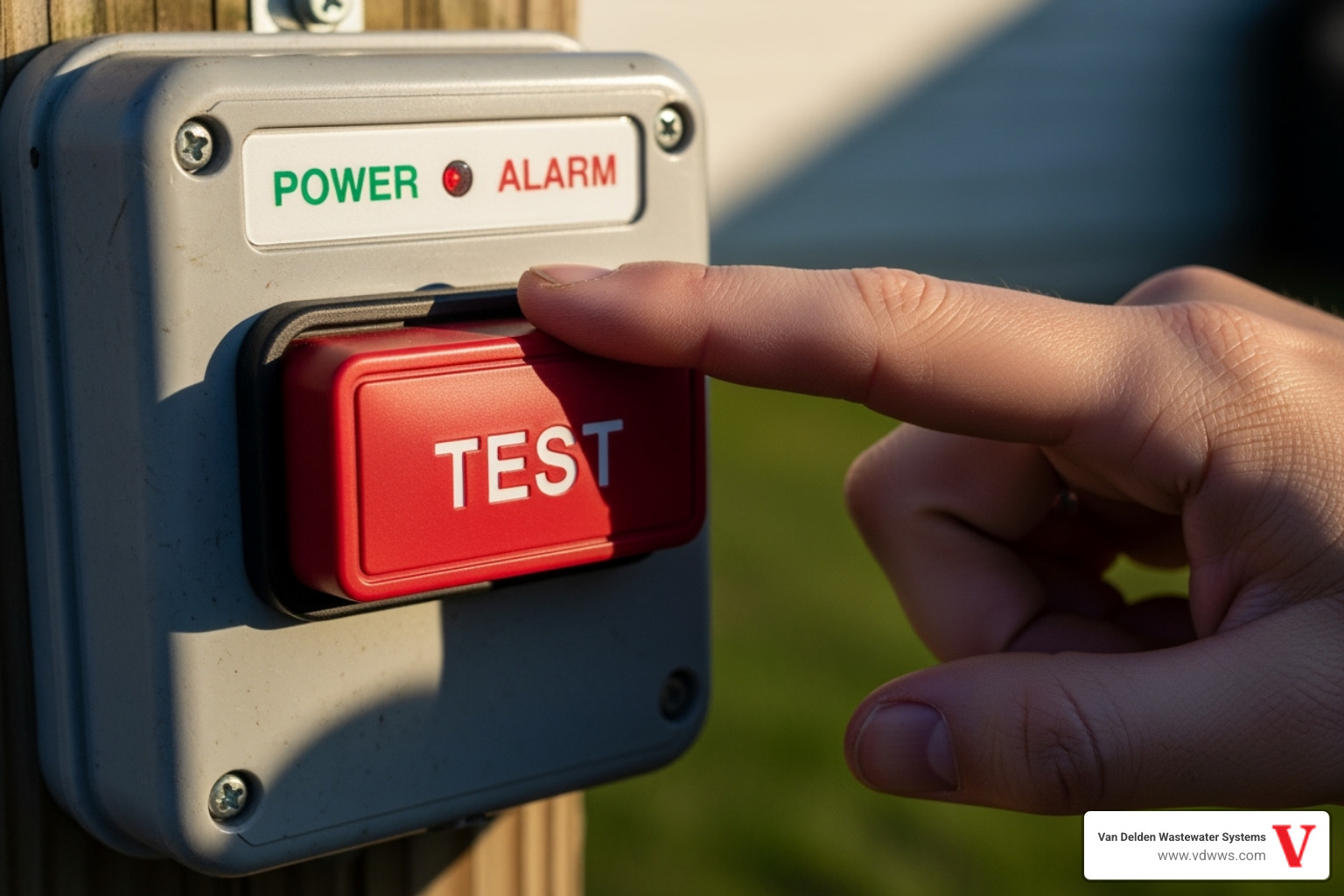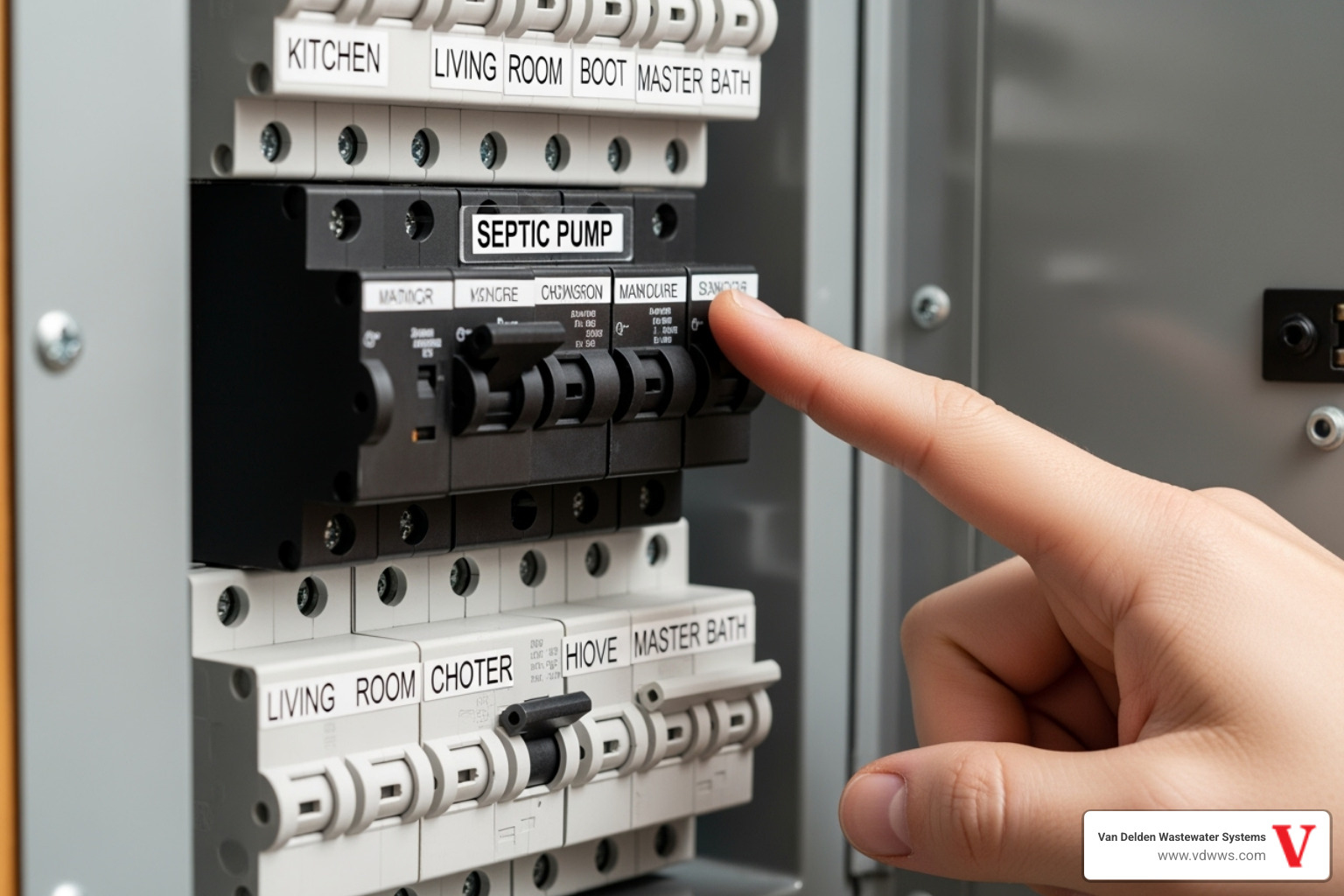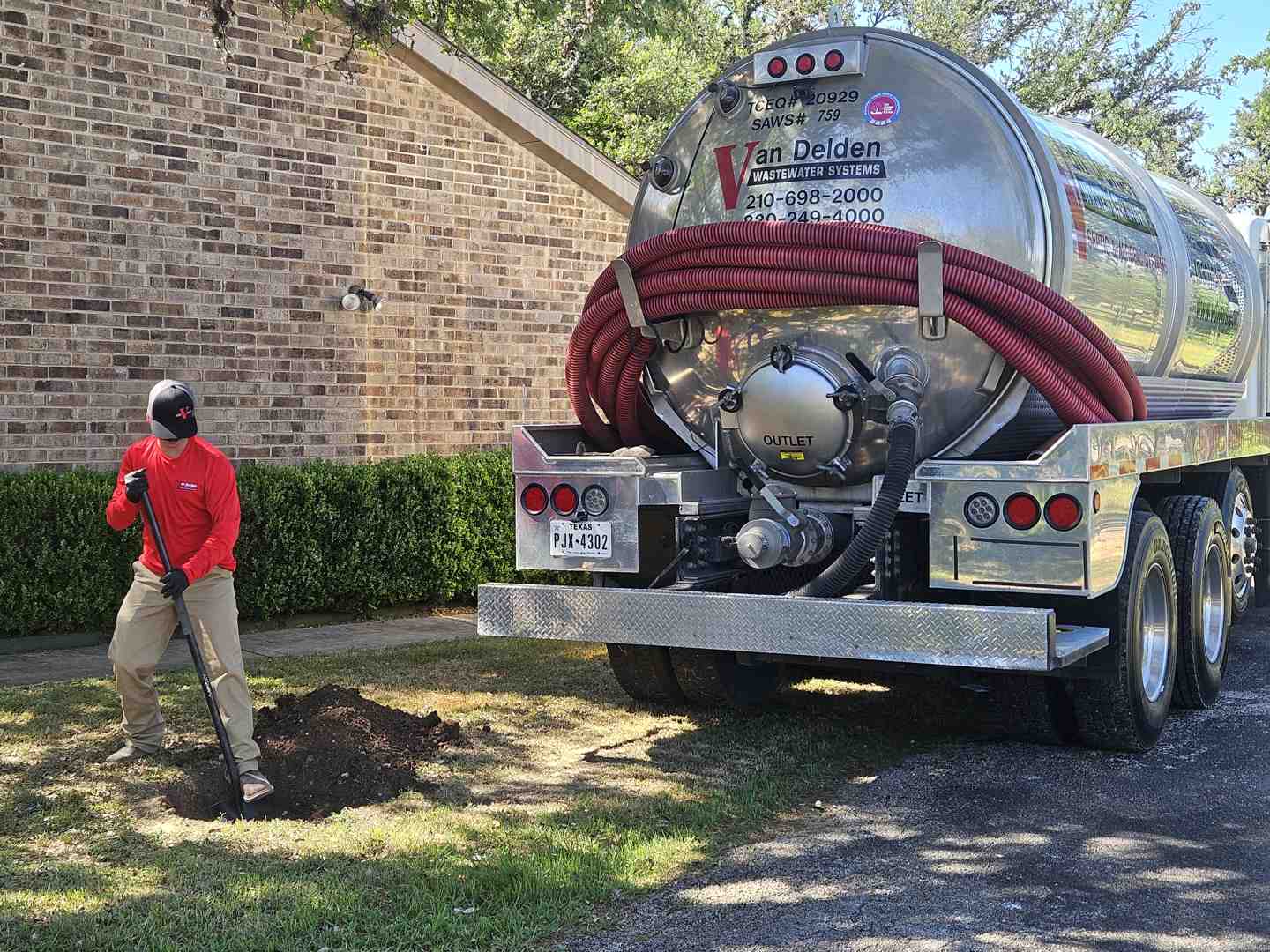When Your Septic Tank Alarm is Going Off: Don't Panic, Take Action
When your septic tank alarm going off catches you off guard, it's natural to feel panicked. But here's the good news: that alarm is doing exactly what it's designed to do - warning you about a problem before it becomes a disaster.
Quick Action Steps When Your Septic Alarm Sounds:
- Silence the alarm by pressing the red button on the control panel
- Check the lights - green means power is on, red means there's an issue
- Reduce water usage immediately - no laundry, short showers only
- Check your electrical panel for tripped breakers
- Call a professional if the red light stays on after 10 hours
Your septic alarm gives you a 24-48 hour window before a backup occurs. This isn't an immediate emergency, but it does require prompt attention. The alarm typically activates when water levels in your tank are too high or too low, signaling issues with your pump, electrical system, or drain field.
Most septic alarms go off due to excessive water usage, heavy rainfall saturating the drain field, or pump malfunctions. Understanding these common causes helps you respond appropriately and avoid costly damage to your system.

First Response: What to Do When Your Septic Alarm Sounds
When your septic tank alarm going off breaks the peace, that jarring sound is your system's way of giving you a heads-up before things get messy. Your first move is to press the silence button on the alarm control panel, usually mounted on your house or near the tank. Silencing the alarm stops the noise, but the underlying problem still needs to be addressed.

Next, check the indicator lights on your control panel. A green light means the system has power. A red light indicates a problem, usually that water levels are too high or too low.
You must conserve water immediately. Your septic system is struggling, and reducing water flow gives it a break. This means:
- No laundry. Washing machines use a lot of water and can overwhelm the system.
- Keep showers short and space them out.
- Only flush toilets when absolutely necessary.
- Postpone running the dishwasher.
When the alarm sounds, you typically have a 24-48 hour buffer before a backup occurs. This window gives you time to troubleshoot and call a professional if needed, but the buffer only works if you significantly reduce water use.
Finally, check your home's electrical panel for a tripped breaker. Find the circuit for your septic pump and see if it's off. If so, flip it back on. If it trips again immediately, don't force it—this signals a larger issue that requires a professional.
For more detailed guidance on handling your alarm activation, check out our comprehensive guide on What Do I Do If My Alarm Is On.
Diagnosing the Problem: Why Your Septic Tank Alarm is Going Off
Once you've silenced the alarm and started conserving water, it's time to understand why your septic tank alarm going off happened. Most alarms are triggered by predictable issues.
High Water Levels: The Most Common Culprit for a Septic Tank Alarm Going Off
High water levels are the most frequent cause of septic alarms. This happens when more water enters the tank than can be pumped out, triggering the alarm.
Excessive water use is a simple explanation. If you've had guests, done multiple loads of laundry, or used more water than usual, your system may not be able to keep up. It needs time to process the extra volume.
Heavy rainfall can saturate your drain field, preventing it from absorbing more water. The treated wastewater from your tank has nowhere to go, so it backs up, raising the water level and sounding the alarm. This is the system working correctly to prevent sewage from backing up into your home.

- Groundwater infiltration occurs when groundwater seeps into the septic tank through small cracks or loose connections, adding extra water and raising the level.
If your alarm activated during or after heavy rain, it's likely weather-related. For more details, see our guide on Why Does the Rain Make My Aerobic System Alarm Activate.
Pump and Float Failures
Many modern septic systems use a pump to move treated wastewater to the drain field. When the pump fails, water levels rise.
Effluent pump malfunctions can be caused by age, clogs from flushed items (wipes, feminine products), or a burned-out motor.
Float switch problems are also common. These devices rise and fall with water levels, signaling the pump when to turn on and off. If a float gets stuck, tangled in debris, or wears out, it can't signal the pump correctly, leading to high water levels.
Low water level alarms exist in some systems to prevent the pump from running dry and overheating. This alarm is less common but protects the pump from damage.
Pump and float issues usually require professional repair. For more on what different alarms mean, visit What Does My Alarm Activation Mean.
Electrical Issues and Power Problems
Since your septic pump is electric, power problems can trigger the septic tank alarm going off.
- Tripped breakers are the most common and easiest electrical issue to fix. Check your home's electrical panel for the septic pump's breaker. If it's tripped, flip it completely off, then back on. If it trips again, there's a deeper electrical problem that needs a professional.

Power outages will stop the pump from working, allowing wastewater to accumulate. Many alarms have battery backups to warn you of rising water levels even when the power is out.
Faulty wiring and timer malfunctions are more complex issues. Wiring can degrade, and timers that control pump cycles can fail, causing water to build up.
If you've checked the breaker and the system still isn't working, it's time to call an expert. For timer-related issues, see our article on Why Aerobic System Timer Stops Working.
From Fixes to Prevention: Long-Term Septic System Health
While knowing how to react to a septic tank alarm going off is crucial, preventing it is even better. A little proactive care can keep your system running smoothly for decades.
- Regular maintenance is the foundation of septic health. Have a qualified technician inspect your system annually to check the pump, floats, and electrical components.
- Routine pumping every 3-5 years (depending on household size and tank capacity) is essential. This removes accumulated solids that can clog your drain field and trigger alarms.
- Water conservation prevents hydraulic overload. Spread out water usage, install low-flow fixtures, and fix leaky faucets and toilets promptly.
- Protect your drain field. Never drive or park on it, as the weight can compact soil and crush pipes. Keep trees with invasive roots away from the area, as they can infiltrate and block drain lines.
Perhaps the most important tip is to watch what goes down your drains. Your septic system is only designed for human waste and toilet paper.

Never flush or pour these items down the drain: wipes (even "flushable" ones), grease and oils, feminine hygiene products, diapers, paper towels, dental floss, medications, chemical drain cleaners, and food scraps. These items can cause clogs or kill the beneficial bacteria your tank needs to break down waste. When in doubt, throw it in the trash.
Following these practices helps prevent alarms, extends your system's life, and protects your investment. For more comprehensive guidance, check out this helpful resource: Learn more about septic system care.
When to Call a Professional
While some DIY troubleshooting is possible, there are clear signs that your septic tank alarm going off requires professional attention. Ignoring these warnings can turn a manageable repair into a costly disaster.

Call a professional if you notice:
- A persistent alarm. If the red light stays on for more than 10-15 hours after you've checked the breaker and conserved water, it's time to call for help.
- Sewage odors. A rotten egg smell near your tank, drain field, or inside your home indicates that untreated wastewater is escaping.
- Gurgling sounds. Noises from your toilets or drains often signal a blockage or flow problem in your plumbing.
- Backups in your home. Sewage coming up through sinks, tubs, or toilets is an emergency. It means your system is completely overwhelmed and poses a serious health hazard.
- Puddles or lush grass in the yard. Standing water or suspiciously green patches over your drain field mean wastewater is surfacing.
Ignoring a septic tank alarm going off can lead to expensive property damage, health hazards from bacteria and pathogens, environmental contamination, and even complete system failure. A septic alarm can prevent nearly all sewer backups, but only if you act on the warning.
When you call Van Delden Wastewater Systems, you're getting more than just a repair service. As a family-owned business established in 1937, we bring generations of expertise to your problem. Our honest, background-checked, non-commissioned technicians believe in educating our customers and providing quality work with detailed service forms and photo documentation. We're here to help homeowners throughout areas like Boerne, Bulverde, Fair Oaks Ranch, Garden Ridge, Helotes, Timberwood Park, Hollywood Park, San Antonio, Shavano Park, and Spring Branch, Texas steer these challenges with expertise and genuine care.
For more detailed information about alarm activations, especially in aerobic systems, visit our guide on Aerobic System Alarm Activation.
Frequently Asked Questions about a Septic Tank Alarm Going Off
When your septic tank alarm going off catches you by surprise, it's natural to have questions. Here are straightforward answers to the most common concerns.
How long can I use water if my septic tank alarm is going off?
Your septic system has a reserve capacity that typically provides a 24-48 hour window before a backup might occur. However, this timeframe assumes you drastically reduce your water usage immediately. Since the system is already struggling, you must give it a break.
This means:
- No laundry.
- Keep showers short and spaced out.
- Flush only when absolutely necessary.
- Do not run the dishwasher.
By cutting back, you extend the 24-48 hour window, buying time for the issue to resolve or for a professional to arrive.
Can heavy rain cause my septic tank alarm to go off?
Yes, heavy rain is a very common reason for a septic tank alarm going off. When a downpour saturates the soil in your drain field, it can no longer absorb treated wastewater from your tank. The water has nowhere to go, so it backs up, raising the level in the tank and triggering the high water float switch. Sometimes, groundwater infiltration through small cracks in the tank can worsen the problem.
Rain-related alarms are often temporary. Once the ground dries out (which can take 12-24 hours or more), the system can usually function normally again. However, you should still conserve water during this time. If the alarm persists long after the ground has dried, call a professional, as it may indicate an underlying drain field issue. For more on this topic, read our article on Heavy Rain: What to Do When Your Aerobic System Alarm Activates.
What's the difference between an alarm on a gravity system versus a pump system?
Understanding your system type explains whether you should expect a septic tank alarm going off.
Gravity-fed systems use the natural slope of your property to move wastewater from the tank to the drain field. They rely entirely on gravity and have no electrical components like pumps. Because there is no pump, these systems typically do not have alarms. The first sign of a problem is often slow drains or a backup.
Pump systems include aerobic systems, lift stations, or any setup that uses an electric pump to move wastewater to the drain field. This is necessary when the drain field is at a higher elevation than the tank. The alarm in these systems acts as a pump failure warning and a high-water alert. It uses float switches to monitor the water level and sounds an alert if the pump fails or can't keep up with demand. The alarm is an essential early warning system for pump-based systems.
Conclusion
When your septic tank alarm going off startles you, remember it's your system's early warning signal working as designed. That beeping isn't announcing a disaster; it's providing a crucial 24-48 hour window to take action before a messy backup occurs. It's not a catastrophe, but a call to action.
We've covered the common causes, from excessive water usage and heavy rainfall to pump and electrical issues. Understanding these empowers you to respond appropriately. The key is prompt action and water conservation. While a tripped breaker is a simple fix, most issues require professional expertise to diagnose and repair safely.
Ignoring a septic tank alarm going off can lead to costly property damage, serious health hazards, and environmental contamination. The alarm is your best defense against these outcomes, but only if you heed its warning.
At Van Delden Wastewater Systems, we've been helping Texas families steer these challenges since 1937. Our experienced, background-checked technicians are committed to providing honest, professional service that gives you peace of mind. We serve homeowners throughout Boerne, Bulverde, Fair Oaks Ranch, Garden Ridge, Helotes, Timberwood Park, Hollywood Park, San Antonio, Shavano Park, and Spring Branch, bringing decades of family-owned expertise to your doorstep.
Regular maintenance and smart habits can prevent most alarms. But when they happen, you now have the knowledge to respond confidently.
For reliable inspections and pumping services in the San Antonio area, schedule your septic system pumping today. We're here to keep your wastewater system flowing smoothly and your alarms silent.
Customer Reviews
Peter was personable, professional and thorough. Highly recommend Van Delden. You might be able to find a cheaper company but not better!
On time. 100% professional, knowledgeable, and courteous. Very helpful and straightforward. That is the bar all businesses should strive for.
It has been a pleasure working with your company. Not only did y’all communicate very well but your workers were always polite! Thank you!
“I thank Van Delden for such prompt service. Honest people are hard to come by these days. I will certainly recommend Van Delden to anyone! Jesse is an upstanding young man and very nice to talk to. I thank everyone at Van Delden for taking such good care of me.”
This is just a note to thank you for explaining the problem with my system. You didn’t have to be so kind and I appreciate your good business ethics and time spent. In the future you will have mine in return!






